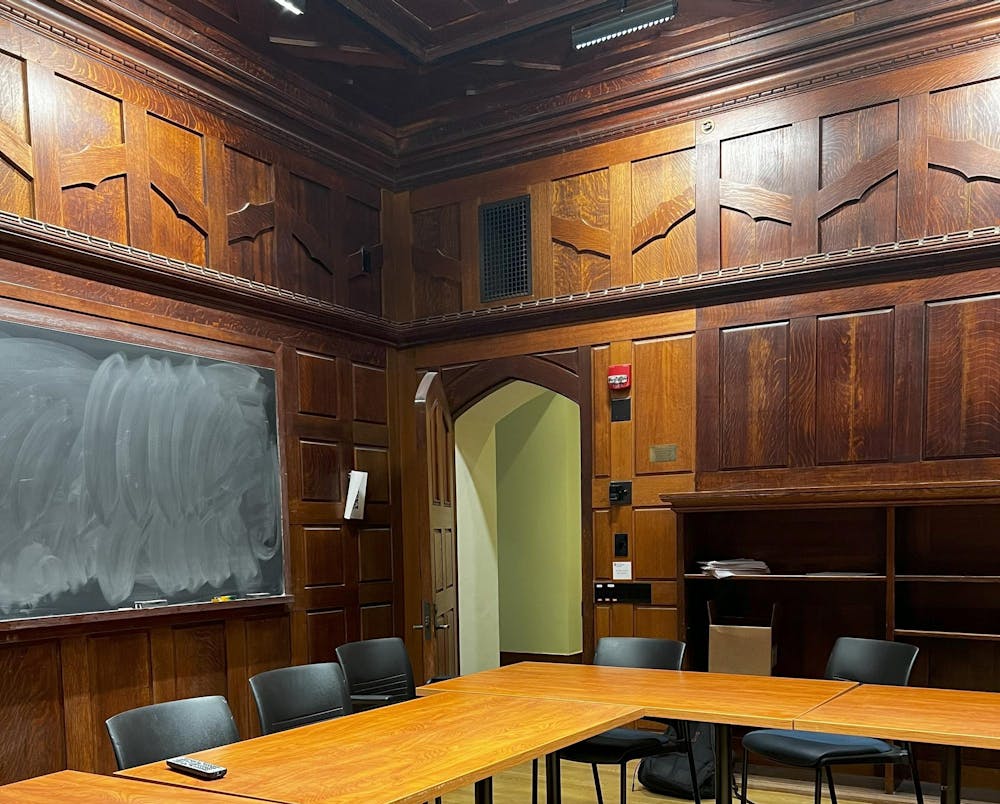The Freshman Seminar (FRS) program has been a cornerstone tradition for first-year student experiences since 1986. Initially proposed as a “Freshman Seminar program centered in the Residential Colleges,” the program was designed to offer first-year students small, seminar-style courses led by faculty members and provide an early opportunity for focused inquiry and faculty interaction. Since then, the program has expanded, now offering around 30–45 courses across an array of disciplines each semester.
In each of the six semesters from Fall 2022 to Spring 2025, FRS courses that fall into the Literature and the Arts (LA) distribution dominate the offerings, peaking in Fall 2023 with 23 courses. In other semesters, 11 to 16 LA courses were offered. The Science and Engineering with Laboratory (SEL) distribution generally maintains a low but consistent FRS presence, with one to six courses per semester. In data aggregating all 232 FRS courses, the largest segment remains the LA area, accounting for 34 percent of the total number of FRS courses. This trend indicates the program’s emphasis on courses in the humanities and social sciences for first-year students, while still offering a range of courses in other disciplines.
“We put out a call for proposals every year,” Associate Dean of the Freshman Seminars program Alec Dun said in an interview with The Daily Princetonian. “We accept courses that are good, so it doesn’t really matter what the distribution requirement is.”
Though there is no preference for courses in certain distribution areas, Dun receives a large number of proposals from the LA distribution area, most coming from the Lewis Center of the Arts.
“Faculty from the natural sciences and engineering schools typically have less flexibility in their teaching schools, because certain sequential courses have to be taught every semester, whereas our humanities and social sciences faculty can teach more flexibly,” Dun said.
Students intending to major in all disciplines can take any Freshman Seminar, offering an accessible method for all to explore different interests early in their college experience.
“I think it’s exciting that I get to draw in students from the humanities, the social sciences, and the arts,” Craig A. Marshall said. Marshall’s course, FRS 129: Visualizing Nature — Techniques in Field Biology, satisfies an SEL distribution.
“It allows me to really engage with students from different backgrounds, and that is something I never really had the opportunity to do when I was a TA for Evolution or Introduction to Biology in graduate school,” he continued. “I know that a lot of them are taking [FRS 129] to fulfill an SEL requirement, but I make it my personal mission to make them fall in love with nature. And if that’s the one thing I do in the course, then it is worth it, to me.”
Diana Luu ’28 is currently enrolled in FRS 127: Body Builders — Living Systems as Art Media, another SEL offered this semester.
“As someone who is a STEM major, I wouldn’t say that FRS 127 expanded my knowledge of the sciences through its labs, but it expanded my knowledge of how the arts can be involved in the sciences,” Luu said.
Freshman Seminars introduce the most new courses of any department each term, but many of these seminars extend beyond a single semester. Out of the 232 FRS total courses offered across the six semesters, there are 101 courses that have been only offered once, 34 courses that were offered twice, and 21 that have been offered three times.

“We almost never have courses that are not popular, so it fundamentally depends on the faculty’s availability,” Dun said. “If they want to keep teaching for us, and it’s gone well — which it almost always does — we welcome them back.”
“There are definitely times when we’ll say to folks, ‘Why don’t you take some time away and give someone else a chance?’” Dun said, commenting on how the replacement of Freshman Seminars is not due to student satisfaction.
Over the nine distribution requirements, the average rating ranged from 4.30 to 4.51.
For Freshman Seminar courses that have been offered for more than one semester, course evaluations play an important role for professors, as they allow them to tailor their teaching to what the students want.
“I take my evaluations very seriously, and I want to make sure that I’m making changes from year to year,” Marshall said. “I have conversations with students, and I ask them in-person. They’re honest on the evaluations, and in my first year teaching this course, I had a couple of students say, ‘We wish we had more assignments.’”
There is an application process for first-year students who wish to enroll in an FRS course. The application for the Spring 2025 semester was due on Nov. 6, and students could rank their top five choices in the application portal.
According to Dun, there is no preference for students who had not already enrolled in an FRS course in the fall semester, and the algorithm “maximizes enrollment according to students’ prioritized lists.” However, Dun did say that he does not have specific back-end knowledge of how the algorithm works. Dun believes the rumor of the algorithm prioritizing students who have yet to take a Freshman Seminar stems from an older system from around five years ago where students wrote applications for courses.
“We wanted anyone who wanted to take a course just to be able to put their list in and take a course,” Dun said.
Andy Lau is a contributing Data writer for the ‘Prince.’
Hellen Luo is a contributing Data writer for the ‘Prince.’
Please send any corrections to corrections[at]dailyprincetonian.com.








